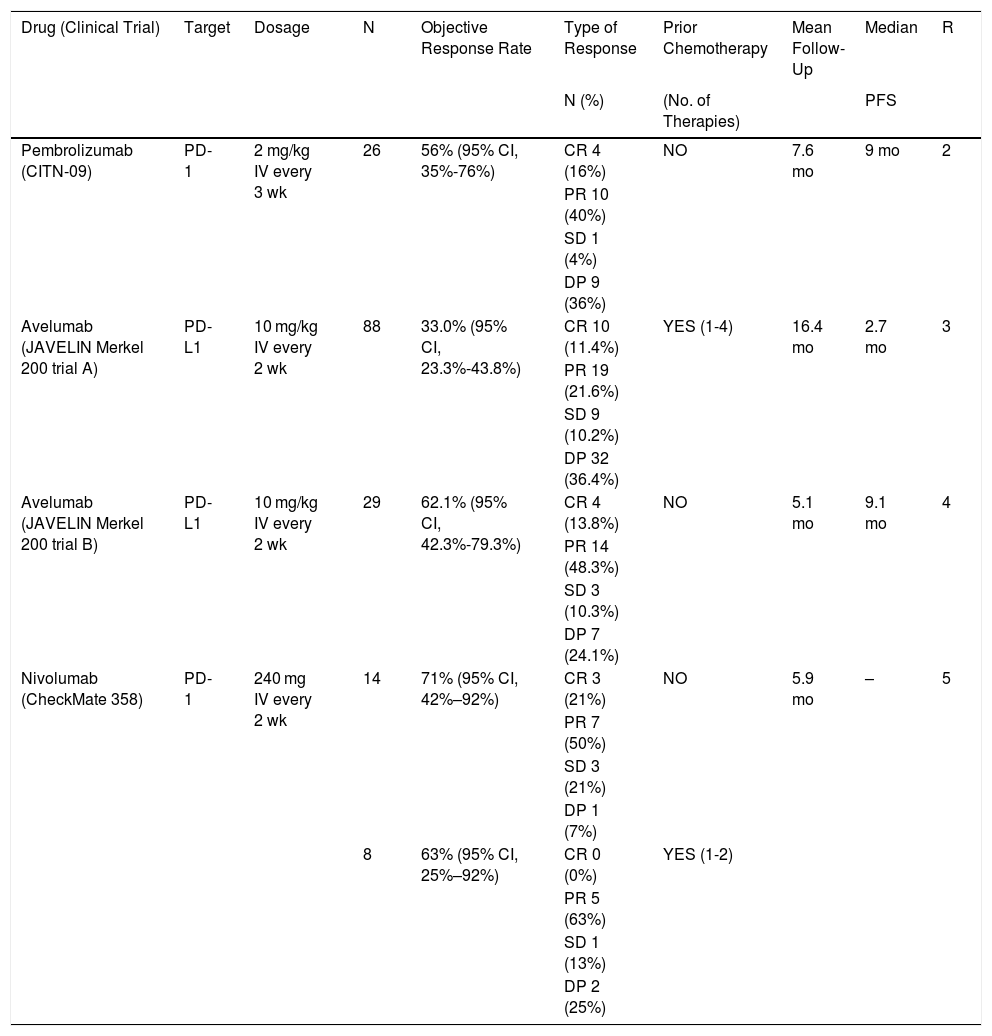Merkel cell carcinoma (MCC) is an aggressive neuroendocrine carcinoma that frequently develops metastases and has a high mortality.
Different chemotherapy regimens have been used in first-line treatment of advanced forms, with initial response rates of up to 55%, but of short duration (a mean of 3 months) and with high toxicity.1
The therapeutic panorama of advanced MCC has evolved rapidly with the arrival of immune checkpoint inhibitors. These drugs have opened up the field of immuno-oncology in this tumor and have shown promising results with high response rates, between 56% and 71%, and a mean of 9 months free of progression in patients who have not undergone prior chemotherapy,2–4 as well as better tolerance compared to chemotherapy.
Nevertheless, these drugs present multiple adverse reactions, the most frequent of which are fatigue, abnormal analyses, reactions linked to perfusion or adverse immune reactions, such as hypothyroidism, colitis, myositis, and insulin-dependent diabetes mellitus.
At present, the most studied and most promising therapeutic targets in MCC are aimed at blocking the receptor of programmed cell death protein 1 (PD-1) or its ligand (programmed death ligand 1 [PD-L1]), both of which are involved in a signalling pathway that plays a role in immune-evasion mechanisms or tumor adaptive resistance.
Pembrolizumab was the first monoclonal antibody to show tumor regression in patients with MCC in a multicenter study carried out by Nghiem et al, in which the authors found a therapeutic response in polyomavirus-positive and polyomavirus-negative tumors, with response rates of between 44% and 62%, respectively, and a mean survival free of progression of 9 months2 (Table 1).
Data of the Main Clinical Trials Against PD-1/PD-L1 in Advanced Merkel Cell Carcinoma.
| Drug (Clinical Trial) | Target | Dosage | N | Objective Response Rate | Type of Response | Prior Chemotherapy | Mean Follow-Up | Median | R |
|---|---|---|---|---|---|---|---|---|---|
| N (%) | (No. of Therapies) | PFS | |||||||
| Pembrolizumab (CITN-09) | PD-1 | 2 mg/kg IV every 3 wk | 26 | 56% (95% CI, 35%-76%) | CR 4 (16%) | NO | 7.6 mo | 9 mo | 2 |
| PR 10 (40%) | |||||||||
| SD 1 (4%) | |||||||||
| DP 9 (36%) | |||||||||
| Avelumab (JAVELIN Merkel 200 trial A) | PD-L1 | 10 mg/kg IV every 2 wk | 88 | 33.0% (95% CI, 23.3%-43.8%) | CR 10 (11.4%) | YES (1-4) | 16.4 mo | 2.7 mo | 3 |
| PR 19 (21.6%) | |||||||||
| SD 9 (10.2%) | |||||||||
| DP 32 (36.4%) | |||||||||
| Avelumab (JAVELIN Merkel 200 trial B) | PD-L1 | 10 mg/kg IV every 2 wk | 29 | 62.1% (95% CI, 42.3%-79.3%) | CR 4 (13.8%) | NO | 5.1 mo | 9.1 mo | 4 |
| PR 14 (48.3%) | |||||||||
| SD 3 (10.3%) | |||||||||
| DP 7 (24.1%) | |||||||||
| Nivolumab (CheckMate 358) | PD-1 | 240 mg IV every 2 wk | 14 | 71% (95% CI, 42%–92%) | CR 3 (21%) | NO | 5.9 mo | – | 5 |
| PR 7 (50%) | |||||||||
| SD 3 (21%) | |||||||||
| DP 1 (7%) | |||||||||
| 8 | 63% (95% CI, 25%–92%) | CR 0 (0%) | YES (1-2) | ||||||
| PR 5 (63%) | |||||||||
| SD 1 (13%) | |||||||||
| DP 2 (25%) |
Abbreviations: IV indicates intravenous; PFS, progression-free survival; R, bibliographic reference; CR, complete response; PR, partial response; SD, stable disease; DP, disease progression.
In terms of avelumab, efficacy data is available from 2 clinical trials. The first of these trials evaluated the clinical response in patients in whom conventional chemotherapy had failed, with objective response rates of 33%,3 whereas the second clinical trial showed better results in patients who had not undergone prior chemotherapy, with objective response rates of 62.1%.4 Based on these results, avelumab obtained approval in 2017 from the US Food and Drug Administration (FDA) and the European Medicines Agency (EMA) for first-line treatment of metastatic MCC.
Nivolumab is another targeted therapy under evaluation in a phase 1/2 clinical trial. Preliminary results are promising both in patients who received prior chemotherapy and in those who did not, with objective response rates of 63% and 71%, respectively, and a mean response time of 2 months5 (Table 1).
Other emerging therapeutic targets exist, such as selective blocking of cytotoxic T-lymphocyte-associated protein 4 (CCTLA-4) using drugs such as ipilimumab. Clinical trials of this drug are under way both as adjuvant treatment after tumor excision and for metastatic disease, in single-drug therapy and in combination with PD-1 inhibitors, such as nivolumab, although preliminary results are not yet available.
Interest has also been growing recently in new targets aimed at tumor angiogenesis, as MCC expresses vascular endothelial growth factors (VEGF), growth factors derived from platelets and C-kit. Nevertheless, the only data available on these pathways are from case series with drugs such as pazopanib and cabozantinib, in which stabilization of the metastatic disease for between 5 and 41 months, and complete response in 1 case, have been reported.6
In conclusion, immunotherapy has shown high objective response rates in immunocompetent patients; nevertheless, few studies exist that have evaluated the response in immunosuppressed patients or patients who have undergone prior chemotherapy, both of which are usual conditions in these patients. Furthermore, despite the major advances achieved, different adverse effects, lack of response, and progression of the disease after the initial response have been reported in immunotherapy and we therefore believe that new therapeutic strategies in MCC need to be identified.
Please cite this article as: García-Gil MF, Ramírez-Lluch M, Concellón-Doñate MA. FR -Inmunoterapia en el carcinoma de células de Merkel. Actas Dermosifiliogr. 2021;112:553–555.





